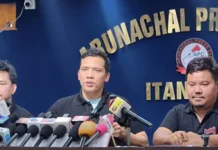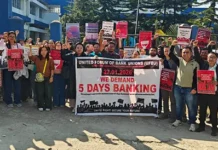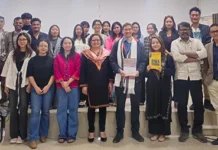ZIRO, 20 Jan: Remembering the state’s first-generation leaders – known and unknown – who toiled hard and nurtured Arunachal Pradesh, Deputy Chief Minister Chowna Mein said “it is high time we must write our history in our own perspective and give due recognition to many of our tribal heroes of the state who defied the British and the colonial rule and sacrificed their lives while protecting our land and people.”
Speaking during the golden jubilee celebration of Arunachal here in Lower Subansiri district on Thursday, Mein informed that the state government is “making an effort in writing books and research papers on the political history of Arunachal Pradesh, in addition to other facets of life, and has engaged research scholars from RGU to collect relevant documents from various institutions like British libraries, national libraries, national archives, Assam archives, etc.”
“Though we are proud of our developmental achievements through democratic political system during the last five decades, we are yet to make a serious attempt to write our own political history,” he said.
Mein also said that the state government has requested the government of India to include the history of Arunachal in the CBSE syllabus and NCERT books, so that “the next generation and people from the rest of the nation read about the freedom struggle and the sacrifices made by our forefathers.”
“Today is a proud day for all of us, as on this beautiful day Arunachal Pradesh was born 50 years ago, when the erstwhile North-East Frontier Agency was named as Arunachal Pradesh and granted union territory status,” he said.
Mein said that, “from the days of excluded area to the frontier tracts to the frontier agency, followed by union territory and now a progressive and forward-looking state, we are credited with achieving centuries of development in just a few decades. Fifty years back, on today’s date, we just had a few kilometres of motorable roads, only a few schools and hardly any banking institute. But today the state has been adjudged the most improved state in infrastructure with thousands of kilometres of roads criss-crossing numerous mountains and rivers, more than 3,000 schools, a network of bank branches, numerous hospitals, air and rail connectivity, and so on and so forth. No part of the country has witnessed such rapid transition and progress in such a short span of time.”
The DCM also acknowledged the contributions of every citizen of the state, and saluted the valiant jawans of the armed forces, the state police and the paramilitary forces for their selfless service to the state.
“With the birth of Arunachal Pradesh as a union territory on 20 January, 1972, and declaration of Itanagar as its capital on 28 February, 1972, the first pioneering leaders of Arunachal Pradesh paved the way for new form of governance and passed on the baton of leadership to the younger batch of leadership,” he said.
Mein also recalled the contributions of the then research director, late Bibhabasu Das Shastri and the then chief commissioner of Arunachal, late KAA Raja, who coined and gave the name Arunachal Pradesh.
Appealing to the people to pledge to preserve and protect the state’s rich cultural heritage, Mein suggested working together to “preserve our languages, document our folklores and folk stories, document rich knowledge of mountains and forests and such others hundreds of dimensions of our tribal life.” (DCM’s PR Cell)





